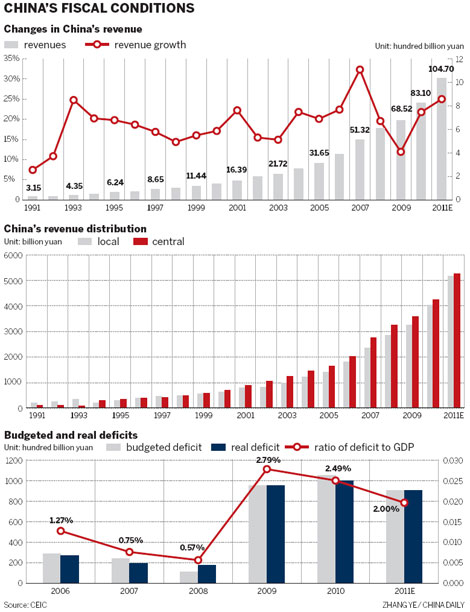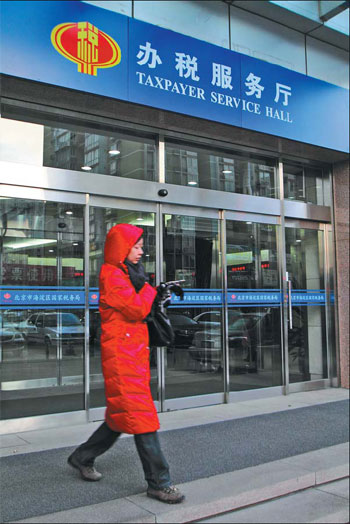Surplus revenue is a taxing problem
Updated: 2011-12-26 07:55
By Wei Tian (China Daily)
|
|||||||||
|
A tax office in Beijing could have a fiscal revenue surplus of 1.44 trillion yuan by the end of December. [Provided to China Daily] |

Experts say the nature of China's budgetary model is a main cause of inefficiency
BEIJING - Like many taxi drivers, Zhang Ping picks up a temporary job at the end of every year, selling fapiao, or receipts, to his passengers. The receipts - which should by rights have been given to Zhang's customers - can then be handed into employers, providing workers with reimbursement for related expenses.
Often, the fapiao - not limited to cab receipts - don't carry specific information about the related purchases and so can be used to claim a variety of expenses.
"At first, I wasn't aware that it was an opportunity to make some extra money, plus it's against the company's rules to do it. But with an increasing number of people asking me to sell them extra tickets, I thought there might be a huge demand and started to save the unused tickets," Zhang said.
The taxi driver could easily save dozens of tickets a day. That amounts to a couple of hundred yuan a week at face value and can often add up to some ten thousand yuan ($1,600) each month.
By selling each ticket at 5 mao - a subdivision of the yuan -Zhang's second job provides him with extra pocket money at this time every year. "I take this as my year-end bonus, although I still feel a little guilty about doing so," he said.
However, what Zhang doesn't realize is that his little business is just a start of a much more complex process, and that his "bonus" is only a drop in the ocean compared with what his customers gain.
A Christmas gift
Although Christmas has not yet been recognized as an official festival in China, different government bodies and public institutions celebrate heartily at this festive time of year, because for them, the shopping budget comes with 12 zeros.
According to the budget set by the government at the start of the year, China's fiscal expenditure for 2011 was to be 10 trillion yuan and the expected revenue was to be 8.97 trillion yuan, 8 percent higher than in 2010.
But plans rarely keep up with events.
According to data from the Ministry of Finance, fiscal expenditure for the first eleven months of the year totaled 8.9 trillion yuan, leaving approximately 1.1 trillion yuan to be spent in December.
Meanwhile, fiscal revenue recorded faster-than-expected year-on-year growth of 26.8 percent to 9.73 trillion yuan by the end of November, already in excess of the full-year target.
And if revenue continues to grow at the targeted rate of 8 percent year-on-year, there will be a surplus of 1.44 trillion yuan by the end of December.
As a result, thanks to "thrifty" finance officers and hardworking tax-payers, there will be about 2.5 trillion yuan left in the account book. Officials will then have to decide whether to spend or save as the New Year approaches.












